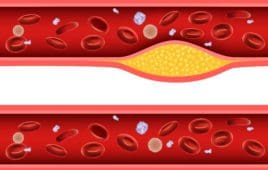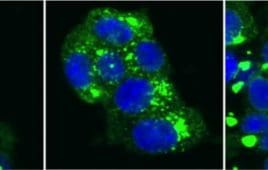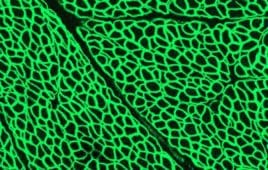
New Discoveries Predict Ability to Forecast Dementia From Single Molecule
Scientists who recently identified the molecular start of Alzheimer’s disease have used that finding to determine that it should be possible to forecast which type of dementia will develop over time – a form of personalized medicine for neurodegenerative diseases. A new study from UT Southwestern shows that single toxic tau proteins that stick together…
CRISPR Screen Identifies Gene That Helps Cells Resist West Nile, Zika Viruses
CRISPR Halts Duchenne Muscular Dystrophy Progression in Dogs
Scientists for the first time have used CRISPR gene editing to halt the progression of Duchenne muscular dystrophy (DMD) in a large mammal, according to a study by UT Southwestern that provides a strong indication that a lifesaving treatment may be in the pipeline. The research published in Science documents unprecedented improvement in the muscle…
Scientists Unravel DNA Code Behind Rare Neurologic Disease
Study: Double-drug Strategy Blocks Escape Route for Most Lung Cancers
A one-two combo punch using two currently available drugs could be an effective treatment for the majority of lung cancers, a study by scientists with UT Southwestern’s Simmons Cancer Center shows. Researchers found that a combination of drugs – one targeting epidermal growth factor receptor (EGFR) and one targeting tumor necrosis factor (TNF) – effectively…
New CRISPR Method Efficiently Corrects DMD Defect in Heart Tissue
New Class of Anti-Cancer Drug Effective Against Kidney Cancer
Clinical Trial Eligibility Criteria a Growing Obstacle
First-in-Class Drug Holds Promise for Therapy-Resistant Breast Cancer
Researchers Report Chemical Reaction with Potential to Speed Drug Development
DNA Vaccine Protects against Toxic Proteins Linked to Alzheimer’s
Gene-Editing Alternative Corrects Duchenne Muscular Dystrophy
Researchers Develop Potential Treatment for Fatal, Incurable Kidney Disease
Researchers at UT Southwestern Medical Center, working with a California biotech firm, have developed a potential drug to treat polycystic kidney disease – an incurable genetic disease that often leads to end-stage kidney failure. The drug, now called RGLS4326, is in preclinical animal testing at San Diego-based Regulus Therapeutics Inc. An investigational new drug filing to…
Cancer Drug Could Promote Regeneration of Heart Tissue
Blocking Ghrelin’s Release May Mediate Low Blood Sugar Effect
Researchers at UT Southwestern Medical Center have identified a previously unknown role of a cellular signaling molecule involved in release of the “hunger hormone” ghrelin, a finding that could have implications for optimal treatment of children taking beta blockers. The molecule, beta 1 adrenergic receptor, is a member of a class of cell surface receptor…















